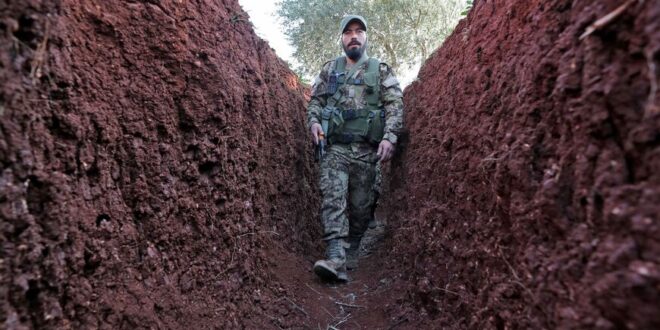The Islamist group Hayat Tahrir al-Sham is digging a trench to isolate its stronghold in Idlib from the Turkey-backed Free Syrian Army-held areas in Aleppo countryside, which will escalate the humanitarian crisis and increase the suffering of millions of Syrian displaced in northwestern Syria.
Hayat Tahrir al-Sham (HTS) has been digging a trench in Syria’s northwestern province of Idlib to isolate the areas it holds from those held by the Turkish-backed Free Syrian Army (FSA) factions in the northern and northeastern Aleppo countrysides.
The digging works, which started in early May in the vicinity of the displaced camps in Atmeh in northern Idlib, stretches all the way to the town of Jindires in Afrin countryside in northern Aleppo.
Ahmad Mansour, a Salafist opposing HTS who resides in a camp in Atmeh, told Al-Monitor, “HTS brought heavy digging machines and equipment to the area on May 1, and has been working around the clock to dig a more than four-meter wide and five-meter deep trench. The equipment is placing the removed soil on one the sides of the trench in order to build a very high berm.”
Mansour said that the trench will extend from the town of Atmeh, near the Turkish border in northern Idlib, to the outskirts of Darat Izza city, a 20-kilometer distance. “Once the works are over, the inhabitants of Idlib and Aleppo countryside will not be able to move easily between the two areas,” he said. “They will have to go through two crossings that separate HTS-held areas from the FSA-held areas.” The two crossings, at al-Ghazawiya north of Darat Izza and at Deir Ballut near Atmeh, are both controlled by HTS.
The trench will go through many displaced camps, Mansour said, and many families will have to move their tents to another location. In the camps in Sfuhen, Umm al-Shuhada and Kafr Aweed, he said, “families will have to vacate their place and go to Mashhad Ruhin, north of Idlib, where they were allocated a place for them to erect their tents. HTS gave them a month-long deadline.”
HTS officials told the displaced that the trench is designed to prevent drug smuggling and the entry of Islamic State (IS) cells from the FSA areas. However, jihadis opposing HTS believe the real motive is to consolidate its hegemony and that of its affiliated Salvation Government in Idlib.
Abu Ahmed, a displaced resident of the Atmeh camps in northern Idlib, used to smuggle fuel from the FSA areas to Idlib. He told Al-Monitor that the trench will reinforce HTS’ monopoly on food, fuel and other goods whose prices will be controlled by merchants affiliated with HTS in Idlib. Once the trench is completed, he said, “it will be impossible for smugglers, who are mostly children and women residing in the displaced camps in the north of Idlib, to smuggle low-priced commodities and fuel from the FSA areas to Idlib and make small profits to make ends meet.”
HTS had previously shot and killed a woman who was transporting fuel from FSA areas, and arrested a number of children on charges of smuggling.
Abu Ahmed added, “The passage will be exclusively through al-Ghazawiya and Deir Ballut crossings, where taxes will be imposed on people if they carry foodstuffs and goods with them on their way back from FSA areas,” where fuel is sold at a lower price than Idlib.
Speaking to Al-Monitor on condition of anonymity, an official from the Salvation Government in Idlib denied those claims. When the trench has secured the area, he said, “this will allow [HTS] to prevent drug smuggling by women from Aleppo countryside to Idlib. … The trench also aims to prevent the entry of IS elements and agents in women’s clothing, pretending that they are going to the camps. … However, if the area is left wide open, Idlib will be open to these elements and plots.”
He further noted that relations with the FSA factions “are very good and we have no problems with them. This trench is not to isolate Idlib from Aleppo countryside, but to bring about more security and safety for our people, and block the roads for those who seek to spread chaos and drugs.”
Activists in Idlib and Aleppo countryside believe that the trench will increase the suffering of millions of displaced Syrians in the camps, make it extremely difficult to move freely, and boost the influence of the de facto authority in Idlib and the warlords affiliated with it.
 Eurasia Press & News
Eurasia Press & News



